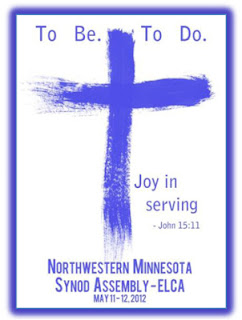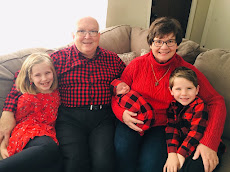To Be. To
Do. Joy in Serving.
Northwestern Minnesota Synod Assembly
May 11, 2012 at Concordia College, Moorhead, MN
John 15:9-17
In the name of Jesus. Amen.
God chooses to do nothing without us.
Let me say that again: “God chooses to do nothing without us.”
Please hear that clearly, friends. I’m not saying that God can’t do anything without
us. I’m saying that God chooses
to do nothing without us.This is God’s modus operandi, God’s M.O. God imagines, speaks and acts always with us, the whole human family and the splendid creation that is our home, clearly in view.
God chooses to do nothing without us.
So, when God creates, as Genesis tells it, the culmination of the whole creation is God’s fashioning of human beings who alone—among all creatures—bear God’s spitting image, reflecting God in all that has been made.
God chooses to do nothing without us.
So, when God acts to rescue and save us, when God intervenes to bring us back from our waywardness, God doesn’t step outside of the creation….but enters more deeply into the creation, for us and for our salvation.
God condescends into our lives, “gets skin in the game” by becoming clothed with our flesh. And then this God-with-human-skin-on lives our life, bears our sin, dies our death, and rises again so that we might never have to wonder whether God is “for us”—come what may!
God chooses to do nothing without us.
So, when God’s astonishing victory in the Resurrected Christ bids to become the story of the world….when the Resurrection of Christ crucified becomes the vibrant heartbeat of the universe….God doesn’t step out of the creation to do all that, but God stoops down again, breathing the Spirit into us, stirring us up with a Pentecost-tempest, and praying within us in sighs too deep for words.
God chooses to do nothing without us.
And that remains true right now and for all the future “nows” God will yet grant us, until the New Creation finally dawns in all its glory.
So, today also, my friends, here and now, my beloved ones, God chooses to do nothing without us.
And this is what that looks like, feels like, tastes like, sounds like….
It looks like Jesus, the Servant Par Excellence, clothed for the humblest work, choosing to do what no first-century master could force even his slave to perform. “I have set you an example,” Jesus says on the night of his betrayal, “that you also should do as I have done to you.” (John 13:15)
This is who our Lord Jesus was and is: “I am among you as one who serves.” (Luke 22:27) That is who I am. That is what I do. And I wouldn’t have it any other way.
It all comes together in Jesus. So, in this gospel lesson Jesus seamlessly weaves together things we try to keep separate: “This is my commandment, that you love one another as I have loved you. No one has greater love than this, to lay down one’s life for one’s friends.” Life-giving love and commandment-keeping service are all of a piece.
Where we construct dichotomies, Jesus creates synergy. Asked to name the greatest commandment, Jesus seems, at first to fudge (like an election-year politician!)—to try to say two things, articulate two commandments.
But not really. The one commandment, the only commandment worth our time and attention is about loving God AND loving the neighbor, not so much as step one and step two—but more on the order of the “heads and tails” of a single coin. You can’t have one without the other—God and our neighbor welded, melded together, for time and all eternity.
That’s because God chooses to do nothing without us, don’t you see?
God is always finagling new ways to climb into human skin, in Jesus, and now in the community that is the Risen Jesus, for the sake of “getting at the world,” saving, restoring, renewing, transforming, making you and me and all things new.
God labors over, God aches for this whole groaning creation, this whole struggling human family….and the way, the main way God “gets at” us, is through us—our voices, our hearts, our feet, our hands.
In case you haven’t noticed, the world has been put together in such a way that we all wind up helping one another.[1] That’s simply a fact of life: God has hard-wired the exchange of energies, the trading of our labors, into the very fabric of things. We can’t help but help one another.
But so that might not be a burden we resent…God remakes us and all things, in the image of Christ the New Adam, we receive back these conditions of life as divine gifts. In Christ, we receive God’s intention to care for us and for all things as what we are privileged to do, called to do.
….Which is that marvelous idea vocation is all about.
Blessed Martin Luther wanted us to know, that all of this is good, because all of it is from God.
So, when God needs something to happen, God commandeers baptized women and men to get into the act. Service, someone has said, is simply love with work clothes on.
So, when the cows need to be milked, God milks them (declared Luther) through vocations of the milk-maids.
And, when you strap on your utility-belt or enter your workshop, God preaches to you through all those tools you’ve managed to accumulate.
“…Just look at your tools—at your needle or
thimble, your beer barrel, your goods, your scales or yardstick or measure….All
this is continually crying out to you:
‘Friend, use me in your relations with your neighbor just as you would
want your neighbor to use his property in his relations with you.’” (Martin Luther)
Serving the neighbor isn’t a hobby or a spare-time
activity. Service to the neighbor is
woven so tightly into the fabric of the New Creation that it starts to become
second-nature for us. It’s simply who we
are, what we do, because God has called us to it.
Service is how God “gets at” the world, in costly care and redeeming compassion.
We will transform those places and people, because God goes with us and works through us.
But we will be transformed, too. That’s why we’re calling them service learning opportunities. We never know who will benefit the most—the one who serves or the one who is served. For that’s how God’s economy of grace works, so very differently from the zero-sum economies of this world. God’s love in Jesus Christ, is the only thing that actually multiplies as it is divided.
Sometimes, sometimes this service learning stuff sneaks up on us, though. We may think that we believe our way into a new way of acting….but it can happen the other way around, just as easily.
C.S. Lewis was once asked, by an earnest Christian: “What if I don’t feel like loving or serving my neighbor?” To which Lewis, without skipping a beat, responded: “Pretend that you do.”
Lewis’s sly rejoinder is illustrated memorably in a story that evangelist Tony Campolo[2] once told:
“…(He recalled a time when he was lecturing at the University of Manchester in England)…”and there were two young men who said, ‘We want to come and work with your team in the cities of America. We want to work in the inner city for the summer, but we have to tell you something. Can we be missionaries with your organization even if we don’t believe in God?’
“(Tony Campolo) paused for a moment and…said of course, but here’s the deal: you’ve got to pretend you believe in God. All summer long you’ve got to do Bible studies with the boys and girls, sing gospel songs, play games, go to church with them on Sunday. If you do all the things that a believer would do, you can come. You don’t have to be a believer.
“You know what happened. Both of those young men are Anglican priests in England today. They were transformed by what they did…”
If the very thought of that tickles you, causes you to smile or even chuckle at the astonishing sacramental serendipity of such service to the neighbor….well then you’ve caught sight of the giddy joy that is afoot here. “I have said these things to you”—about costly love, and commandment-keeping service….”I have said these things to you,” declares our Lord Jesus, “so that my joy may be in you and that your joy may be complete.”
This serving of the neighbor is not some grim,
white-knuckled business, my friends.
This rhythm of faith-filled serving is what we were created for. The salvation that has washed over us in the
life, death and resurrection of Jesus Christ reaches its culmination when we “good
for nothing” sinners are refashioned by Christ into “good for something”
servants—“good for something:” good for being
Jesus, doing Jesus, serving the neighbor as “second-nature” to
us. Being good, and doing good, as
Jesus did and as Jesus does, just for the fun of it…simply for the sheer joy of
it.
In the name of Jesus. Amen.
[1]
Gerhard Forde and James Nestingen, Free
To Be: A Handbook to Luther’s small
Catechism (Augsburg, 1975), p. 52





